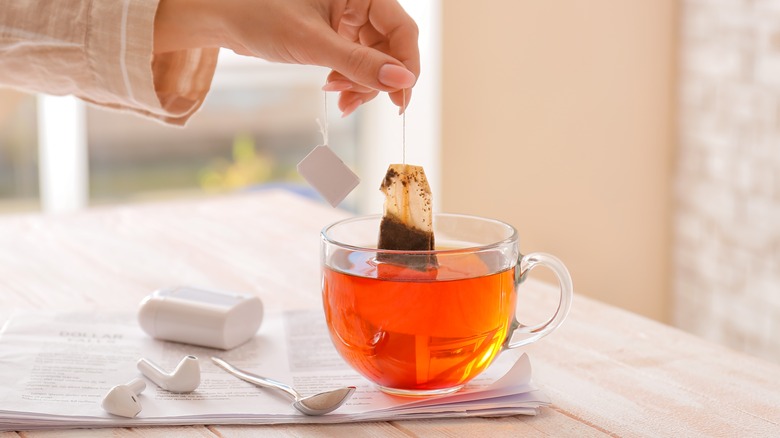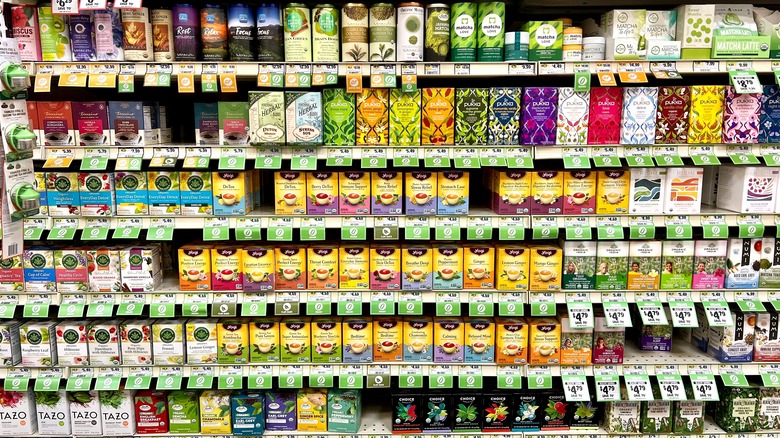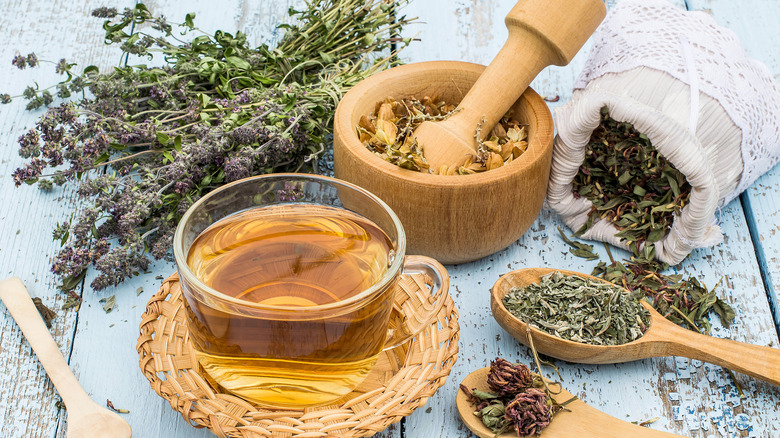Are Tea Bags Really Bad For The Environment?
As pollution rates rise, many household items could be contributing to the issue (via The World Bank). While many products are made with sustainability in mind, others are still having negative effects on the environment. A lot of this is due to single-use plastics that are constantly ending up in the landfills. As more people become aware of these environmentally damaging products, they decide to pursue more sustainable efforts in their home. For example, one of the most popular items that are sacrificed are plastic water bottles and straws. According to Earth Day, 380 million metric tons of plastic are produced every year that just adds to the 8.3 billion metric tons that have been produced since its invention. Of all of that plastic, the outlet also reports that 91% of plastics are never recycled and remain in the rivers, oceans, lakes, and other parts of the environment for years because they are not biodegradable.
Everyday items like dryer sheets, makeup wipes, or menstrual products also contribute to the issue when disposed of. This is because the packaging or the makeup of the material itself contains some form of plastic or another. Microplastics in particular are quickly growing in numbers as they begin to be found even in foods now, which then is not only damaging to the environment but also your health. It can affect your cells, tissues, respiratory systems and more, according to Nature.
Among the growing list of items or foods containing plastics are tea bags. Yes, the hot drink meant to be healthy and to help you relax may also be adding to the problem.
Plastics in tea bags
There is a wide variety of tea companies that make tea and put them in a tea bag for more convenience. It's a simple, quick process to heat up some water and throw your tea bags in it as it steeps into its flavor. However, many of these tea bags consist of some form of plastic (via Country Living). Sometimes, it is on the bag itself when it is not a paper bag, but also in how they seal the bag with a plastic known as polypropylene to secure the tea leaves inside of it.
Additionally, research from McGill University found that these microplastics are then leaked into the drink itself. The study which was published in Environmental Science & Technology, a peer-reviewed journal, found that just one bag of tea released about 11.6 billion microplastic and 3.1 billion nanoplastic particles into the water at brewing temperatures. "We were thinking maybe we'd see 100, or 1,000 particles, but we were absolutely blown away when we saw that there were billions of particles," chemical engineer Nathalie Tufenkji, who was a part of the study, tells Discover.
However, if you love your tea in a bag, you'll be glad to know that not all tea companies take this route. Country Living reports that companies like Abel & Cole, Pukka Herbs, Teapigs, and more are committed to plastic-free tea bags.
Eco-friendly tea consumption
If it feels unsettling to put plastics into boiling water that you will consume as well as disposing of tea bags made of plastic only to end up in the environment, there are other options for the sake of your health and the good of the environment. Consider finding tea companies that don't use any plastic for their tea bags at all, especially if you love the convenience of the tea bag and drink chamomile tea every day (via Because Health).
Founder of the Rare Tea Company Henrietta Lovell tells "The Current" on CBC that tea in a bag limits its full potential for healthful benefits for the drinker. In Lovell's book, "Infused: Adventures in Tea," she makes it her mission to encourage tea drinkers to opt for loose leaf tea, which is healthier for the person drinking it and for the environment. "If you really love tea, you wouldn't put it in a bag — it's like putting Baby [from "Dirty Dancing"] in the corner," she tells "The Current." Lovell says that the loose leaf method also allows for the tea leaves and herbs to fully expand and unfurl, whereas a bag prevents it from doing so. Additionally, you can brew loose leaf tea for up to three to five brews after fully draining it, which Lovell says gives it "deeper" infusions.


